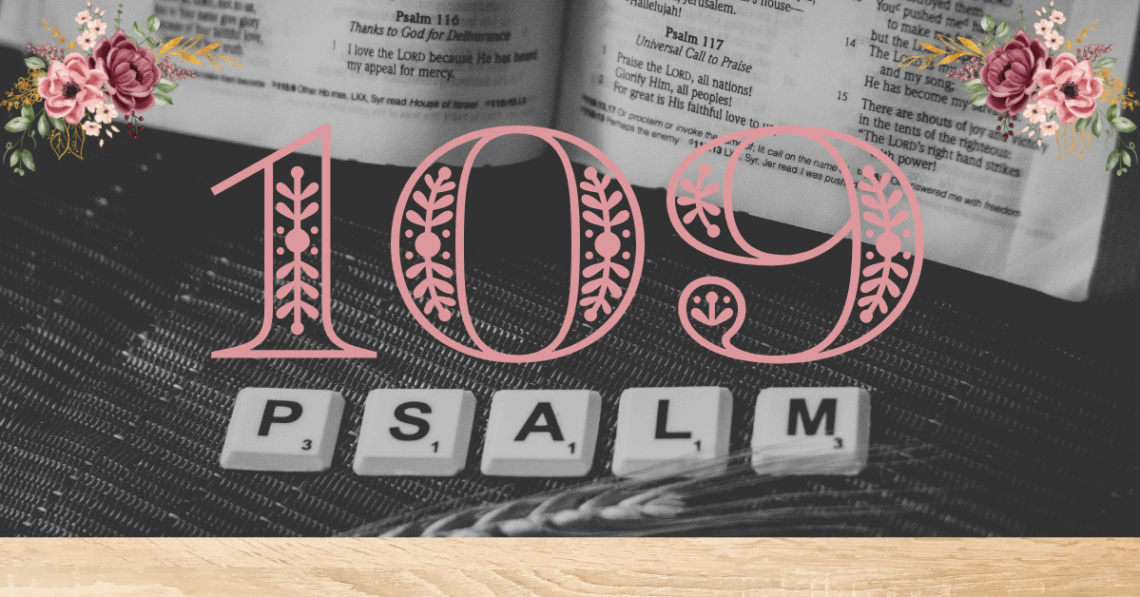Psalm 109 is one of the imprecatory psalms, where David calls upon God to bring judgment on his enemies. It is a heartfelt plea for divine justice in the face of personal betrayal and hardship. David’s enemies have wronged him, spreading false accusations, and he turns to God for vindication. This psalm shows the depth of human emotions in facing injustice, calling out to God in a mixture of sorrow, anger, and trust in His righteous judgment.
Background of Psalm 109
This psalm is attributed to David, who appears to be facing slander and hostility from people who are falsely accusing him. The psalm is often seen as an expression of deep personal hurt, where David seeks God’s intervention. The imprecations in this psalm are strong requests for God’s justice to be enacted, revealing David’s confidence that God is the ultimate judge.
What Does Psalm 109 Mean?
Psalm 109 contains two main sections:
- Verses 1-5: David pleads with God to listen to his complaint, expressing how his enemies are unjustly attacking him.
- Verses 6-31: David calls for God’s judgment upon his enemies, asking for their punishment and the restoration of justice.
The psalm moves from David’s plea for help to a call for God’s justice, and ultimately to an expression of hope in God’s deliverance.
Verse Mapping Psalm 109:1
“God of my praise, do not be silent.” (CSB)
- Word Study
- God of my praise – “El Tehillati,” a name for God that emphasizes His worthiness of praise and glory. It acknowledges that God is the source of all worship.
- Silent – “Chasah,” meaning to be still or remain quiet. This word conveys the sense of waiting or desiring that God not withhold His intervention.
- Cross-References
- Psalm 28:1 – “Lord, I call to you; my rock, do not be deaf to me. If you remain silent to me, I will be like those going down to the pit.”
- Psalm 83:1 – “God, do not keep silent; do not be deaf. God, do not be inactive.”
- Paraphrase “God, You are worthy of my praise, and I cry out to You—please do not remain silent in the face of my suffering.”
- Application David’s plea reflects a deep desire for God’s voice and action in the midst of injustice. When we face situations where we feel oppressed or wronged, this verse encourages us to cry out to God, knowing He is the one who listens to our pleas. In moments of suffering, we are invited to bring our concerns to God, trusting that He hears us and will act in accordance with His justice.
How Can We Apply Psalm 109 Today?
- Bring Your Hurt to God Just as David expressed his pain to God, we are encouraged to bring our own emotional struggles, hurts, and grievances before Him. Whether facing personal betrayal, false accusations, or any form of injustice, we can trust that God hears and understands our pain.
- Trust in God’s Justice David calls upon God to execute judgment on those who are wronging him. In a world where injustice is common, this psalm reminds us that God is the ultimate judge. We are to leave judgment in His hands and trust that He will bring justice, even when it seems delayed.
- Acknowledge God’s Role as the Source of Praise The phrase “God of my praise” is a reminder that God is the source of all worship and honor. In times of trouble, we may be tempted to lose sight of God’s goodness, but this verse calls us to praise God in the midst of difficulties, remembering His faithfulness and power.
- Pray for Deliverance and Justice Like David, we can ask God for deliverance and justice in our lives. It is okay to express our desire for wrongs to be made right, as long as we do so with a heart that seeks God’s will above our own.
- Respond with Faith David’s cry for help is also a demonstration of his faith in God’s ability to intervene. Even as he calls for justice, he does so with the trust that God will answer. We are encouraged to continue praying and trusting, even in difficult situations.
Reflection Questions
- Have you experienced a time when you felt wronged or falsely accused? How did you respond to that situation?
- What does it look like for you to trust in God’s justice in your own life?
- How can you worship God as the source of all praise, especially when facing hardship?
- How do you feel about praying for God’s judgment to come upon those who have wronged you?
A Closing Prayer
Lord, I cry out to You as the God of my praise. Do not be silent in my time of distress. You are just and faithful, and I trust in Your perfect judgment. Please deliver me from my enemies and restore justice. Help me to continue praising You even in the midst of trials. May Your will be done in my life, and may Your name be glorified. In Jesus’ name, Amen.
Final Thoughts
Psalm 109 is a deeply emotional prayer for justice, where David places his trust in God as the righteous judge. It reminds us that we can bring our hurts and frustrations to God, knowing that He hears us. Though the psalm contains strong imprecations, it also reveals David’s unwavering faith that God will act in His time. This psalm teaches us to seek God’s intervention while trusting in His perfect justice.





